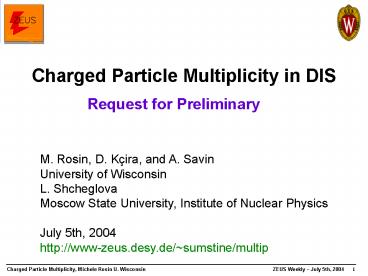Charged Particle Multiplicity in DIS - PowerPoint PPT Presentation
Title:
Charged Particle Multiplicity in DIS
Description:
Charged Particle Multiplicity, Michele Rosin U. Wisconsin. ZEUS Weekly July 5th, 2004 1. M. Rosin, D. K ira, and A. Savin. University of Wisconsin. L. Shcheglova ... – PowerPoint PPT presentation
Number of Views:64
Avg rating:3.0/5.0
Title: Charged Particle Multiplicity in DIS
1
Charged Particle Multiplicity in DIS
- Request for Preliminary
M. Rosin, D. Kçira, and A. Savin University of
Wisconsin L. Shcheglova Moscow State University,
Institute of Nuclear Physics July 5th,
2004 http//www-zeus.desy.de/sumstine/multip
2
Introduction
- Details http//www-zeus.desy.de/sumstine/multip
- short introduction to the method
- new measurement in Breit Frame
- Plots for preliminary
3
Charged Hadrons Effective Mass
- Measure HFS within ?? for best CTD acceptance
- Measure charged tracks, reconstruct number of
charged hadrons - Measure invariant mass of the system (Meff) in
corresponding delta eta region. - Energy is measured in the CAL
4
The use of Meff as energy scale
- For ep in lab frame, measure visible part of
ltnchgt vs. visible part of energy available for
hadronization Meff
Whad
Meff
Lab Frame
Visible part
Meff HFS measured in the detector where the
tracking efficiency is maximized
5
1996-97 Data sample
- Event Selection
- Scattered positron found with E gt 12 GeV
- A reconstructed vertex with Zvtx lt 50 cm
- Scattered positron position cut radius gt 25cm
- 40 GeV lt E-pz lt 60 GeV
- Diffractive contribution excluded by requiring
?maxgt 3.2 - Track Selection
- Tracks associated with primary vertex
- ? lt 1.75
- pT gt 150 MeV
- Physics and Kinematic Requirement
- Q2 da gt 25 GeV2
- y el lt 0.95
- y JB gt 0.04
- 70 GeV lt W lt 225 GeV ( W2 (q p)2 )
735,007 events after all cuts (38.58 pb-1)
6
Event simulation
- Ariadne 96-97 4.08
- Matrix elements at LO pQCD O(?s)
- Parton showers CDM
- Hadronization String Model
- Proton PDFs CTEQ-4D
- Lepto 6.5.1
- Including SCI
- Also used Lepto without SCI
Luminosity of MC 36.5 pb-1
7
Kinematic Variables, Meff and Tracks
- 96-97 data compared to ARIADNE and LEPTO
w/SCI - Both ARIADNE and LEPTO show good agreement
for kinematics, Meff tracks
8
Comparison of ee-, pp, ep
- agreement between ee- and pp for ltnchgt vs.
invariant mass. - ltnchgt 2 vs. Q for ep measured in the current
region of the Breit Frame (CRBF) agree with ee-
and pp for higher Q - Lab frame points lie above ee- and pp, and above
the previous ZEUS measurement in CRBF. - ARIADNE describes data dependence, LEPTO higher
than the data, LEPTO w/ SCI even higher. Used
both for correcting data systematic errors small - Agree with 1995 preliminary measurement of ltnchgt
vs. Meff in lab frame - Request for preliminary
9
Lab frame ltnchgt vs. Meff in x bins
- Check if ep vs. ee- and pp difference is due to
quark and gluon distributions study x and Q2
dependence - x range split into similar bins as in previous
multiplicity paper. - weak x dependence in both data and MC observed
not sufficient to explain difference - Request for Preliminary
- Q2 dependence? gt next page
10
Lab frame x and Q2 bins
- Data described by ARIADNE
- LEPTO above data
- No Q2 dependence observed
- Request for preliminary
11
Breit Frame - Change to scale Meff
- Using Meff agreement between
- Lab frame
- Breit Frame Current Region
- Breit Frame Target Region
- Number of charged hadrons plotted vs. Meff
shows similar behavior for the lab frame, and
current target region of Breit frame - Request for Preliminary
12
Invariant Mass in the Current Region
Current Hemisphere
13
Invariant Mass Calculation
With the same energy of the particles, one gets
very different invariant mass of the system
depending on the system configurations.
14
Invariant Mass Calculation
With the same energy of the particles, one gets
very different invariant mass of the system
depending on the system configurations.
15
Invariant Mass Construction
Current region Breit Frame
- Assume system is collimated
- Expect inv. Mass of CRBF to change significantly
if we mirror each particle, with another
particle with the same energy but opposite
momentum. - M2 (EobsEmirrired)2-(pobs-pmirrored)2
2E - Total number of particles increased by 2
collimated
16
Breit Frame - Change to scale Meff
- Points lie slightly above the ee- points.
- This approximation of invariant mass partially
takes into account the real distribution of the
particles. - Similar studies for target region are hampered by
the fact that the analogy between our target
region and the target region in pp is a bit more
complex. - Request for Preliminary
17
Correlated Uncorrelated Systematics
18
Comparison to 2nd analysis
- Agreement between 1st and 2nd analysis within 1
for all preliminary plots - Lab Frame
- Current Region Breit Frame
- Target Region Breit Frame
- X bins
- X and Q2 bins
- Current Region Breit Frame vs. 2E
19
Summary
- Measured mean charged multiplicity in the Lab and
Breit frame. Compared to predictions, to other
ZEUS data, and ee- - Difference ep vs. ee- and pp
- not due to experimental measurement.
- not due to the choice of frame (Lab Breit).
- not due to quark/gluon distributions.
- is due to choice of scale (Q vs. Meff)
- Plans for the future
- Finish checks in the Breit frame.
- Run on Lepto without SCI
- Make results preliminary soon!
20
Invariant Mass Calculation
Isotropic configuration
Configuration with leading particles
21
Multiplicity ee- and pp
ee-
ee-
pp vs. vq2had pp vs. vspp
pp
Invariant mass of pp
- Agreement between ee- and pp plotted vs. pp
invariant mass































